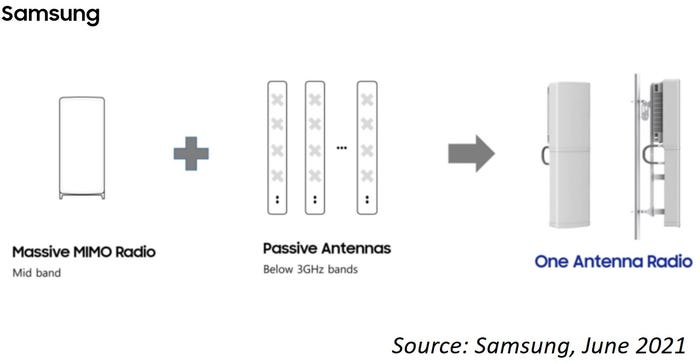Samsung crams multiple antennas into one box to tempt European telcosSamsung crams multiple antennas into one box to tempt European telcos
Samsung has taken the wraps off a new radio design that it hopes will help it gain further traction with European telcos.
June 23, 2021

Samsung has taken the wraps off a new radio design that it hopes will help it gain further traction with European telcos.
The Korean electronics giant has been winning fans with its 5G portfolio – particularly in markets that have shut the door on Huawei and ZTE. A good example would be Samsung’s five-year, $6.6 billion deal with Verizon that it bagged last year.
On this side of the pond, Samsung has been trying to woo Deutsche Telekom with its standalone 5G products, and it recently won plaudits for being chosen by Vodafone to supply equipment for the telco’s OpenRAN deployment.
This week, Samsung unveiled its One Antenna Radio, which consolidates a 3.5 GHz massive MIMO radio with low-band and mid-band passive antennas into a single form factor.

“Recognising that mounting hardware, cabling, crew site time and space limitations are a challenge for most operators, we created a solution to help tackle this issue, and expand deployment boundaries,” said Wonil Roh, SVP and head of product strategy at Samsung’s networks business, in a statement.
Cramming multiple antennas into a single box should result in simpler installation because it eliminates the need to connect each one individually. This should lead to lower labour and maintenance costs. It also takes up less space on a tower, helping operators to save on site rental costs. Furthermore, bolting one ugly box with one or two wires sticking out of it to the side of a building, instead of several, just looks better.
Operators are in a hurry to expand 5G coverage and capacity, which all comes down to rolling out more and more cell sites. Analyst firm Dell’Oro said at the start of this year it expects global 5G core and RAN capex to exceed $20 billion in 2021. Investments in massive MIMO are expected to surpass $10 billion.
“As operators continue to extend their 5G coverage, a key challenge they face is the space and footprint restrictions at sites and on towers,” Samsung said this week. “Samsung’s all-in-one radio will address varied environmental and site demands – easing installation, saving space and reducing OPEX.”
Samsung said its new antenna will become part of its end-to-end RAN portfolio in early 2022, “initially targeting the European market.”
It is interesting that the first port of call for Samsung’s One Antenna Radio is Europe, and points to the scale of its ambition to become a serious player in the global infrastructure market. In addition, Europe is liberally scattered with old cities, where there is greater pressure for high-speed connectivity not to come at the expense of pretty-looking buildings. So it’s a market that lends itself to products like this.
Ericsson and Nokia probably aren’t worried just yet – after all, they no longer have to compete with Huawei and ZTE in several lucrative European markets. However, Samsung is here to stay, and it has Europe firmly in its sights.
Here’s a vid of the whole launch event, which also covered virtualization, 6G and that sort of thing.
About the Author
You May Also Like










.png?width=300&auto=webp&quality=80&disable=upscale)


_1.jpg?width=300&auto=webp&quality=80&disable=upscale)